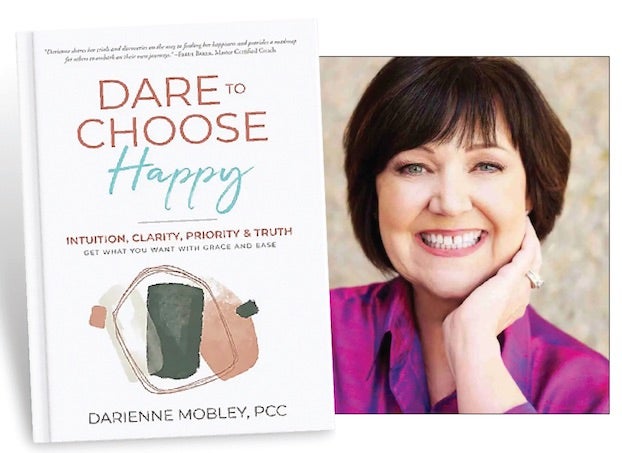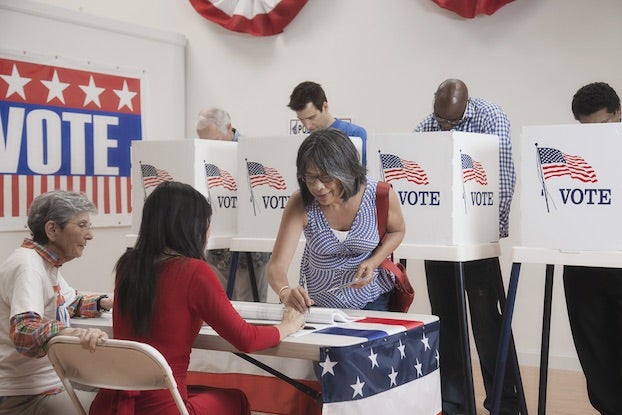Darienne Mobley’s Amazon bestseller examines happiness — a thing most people say they want to be even though most are not quite sure how to make it happen
Published 6:55 am Sunday, July 2, 2023

- On the outside, author Darienne Mobely, right, seemingly had it all: a nice job, respect in the industry, a big house and a great husband. But, in the middle of the night, she would wonder, ‘Is this it?’
Former tourism professional, author and coach Darienne Mobley was in Lake Charles last month to talk about her book, “Dare to Choose Happy.” Choosing ‘happy’ was so life transforming for her, she wants to help others.
“I used to think I was the one that was sort of messed up. Then I started coaching and I figured out you’re kind of messed up too, which has brought me great joy,” she said with a chuckle, speaking to the group gathered in the Visit Lake Charles lobby to hear about her Amazon #1 new release bestseller in the category Occupational and Organizational Psychology.
On the outside, Mobely seemingly had it all, a nice job, respect in the industry, a big house and a great husband.
“Yet, in the middle of the night, I would wonder, “Is this it?’ Is there something missing? I wouldn’t want to talk to anyone about this because I felt guilty that I couldn’t be satisfied with what I had. I have been given so much, shouldn’t I just thank God and move on?”
Some folks might think happiness depends on circumstances outside their control. Not necessarily. A body of research exists that suggests happiness can be pursued (like the Declaration of Independence suggests) and attained. That’s good news for Southwest Louisiana residents who continue their physical and emotional recovery efforts at the start of another hurricane season and are struggling with the highest inflation this country has experienced since the ’80s during one heck of a hot summer.
University of McNeese Department of Social Sciences Professor Matthew Butkus, PhD, HEC-C says ‘happy’ is one of those words bandied about that can mean different things to different people. He and Mirriam-Webster agree that it has something to do with a state of satisfaction or contentment.
A New Jersey University offers a Master of Arts degree in happiness.
“Yes, it’s absolutely for real,” says Dr. Tal Ben-Shahar who has been working on the program since 2015 after successfully teaching a class on happiness at Harvard for many years. Increasing happiness levels can contribute to success in just about every domain, from business to education, from therapy to medicine.
“Most people equate happiness with pleasure, with feeling good,” Ben-Shahar said. “While there is no one right definition of happiness, and we’re all entitled to our own.”
His definition comprises five elements: Spiritual well being, physical well being, intellectual well being, relational well being and emotional well being. Each one of these elements suggest a path to happiness.
Increasing relational well being, for instance, might put a person on a path of kindness and spending quality time with friends and family. Emotional well being might be attained by dealing with painful emotions and cultivating pleasurable ones, according to Ben-Shahar.
Plenty of books, of various length, depth and level of scholarship have been written about the subject. To be clear, none of these books or tips are intended to take the place of medical and professional help for those who suffer from clinical depression and/or other mental health conditions. Kevin Yaudes, PhD, LPC, NCC, University of Louisiana System mental health content expert, assistant department head, Psychology & Counseling, and Kay Dore’ Counseling Clinic faculty advisor, explained that medical and psychological factors can contribute to clinical depression. An imbalance of neurotransmitters such as dopamine, norepinephrine and serotonin, for example, can cause depressive symptoms. So can financial or relationship issues. Addressing medical concerns can lead to an accurate diagnosis and therefore, targeted treatment, according to Yaudes. However, self-help books can assist someone in managing symptoms of depression, according to Yaudes.
Happiness, he said, can look similar across people, but it will always be an individual experience that is influenced by many factors. “Recognizing the things within our control that can make us happy as an individual, for example hobbies, pets, spending time with friends and family and choosing to spend more time doing those things that increase the opportunities to experience happiness for an individual.”
Life is difficult
The lyrics to Grammy-winner Kirk Franklin’s song, “Wanna Be Happy?” go like this, “I just wanna be happy, but if I keep on doing the things that keep on bringing me pain, there’s no else I can blame if I’m not happy. Wasted time but now I see, the biggest enemy is me….”
Seeing the glass half full might take introspection, truth telling and time – in other words, work. Like the first line of the book, “The Road Less Traveled” by M. Scott Peck, M.D., “Life is difficult.”
In Mobley’s work to find happiness, she was helped along the way by a couple of people with whom she crossed paths. One of these people posed the following questions: What are you good at? Where do you really want to live? What do you really want to do with your life?
Mobely didn’t have the answers.
“My job every day was just to do the lists, and as long as I got everything done and didn’t disappoint anyone…
If feelings of happiness, fulfillment, contentment and satisfaction were not tied to being respected in the industry or other people’s opinion of her, Mobley wasn’t sure what was.
She watched “Stutz,”’ Jonah Hill’s documentary about his therapist, Phil Stutz. Stutz said that people who accept that life is made up of pain, uncertainty and constant work are better equipped – and essentially happier – than those who are constantly trying to avoid these things.
Accepting painful emotions without judging those emotions makes a person less likely to be psychologically stressed and experience fewer mood disorder symptoms, according to Dialectical Behavioral Therapy. Accepting doesn’t mean approving. It means not spending energy fighting its existence.
“I would add that we are not guaranteed happiness or satisfaction, that is something we choose,” she said.
Mobely, like many people, thought she was happiest during what she describes as Hallmark moments, birthdays, anniversaries, vacations, Christmas morning, if she had the time after she made breakfast and picked up all the wrapping paper.
Happiness, she has since discovered, and helps her clients realize, is intentional and can be based on much simpler things in life than might be expected. Small changes can have a big impact.
It’s not seeing the ceiling of the Sistine Chapel, she said, although that might be someone’s idea of a happy experience. It is more often a hot bath, lunch with a family member or friend, when the windows are open and a soft breeze is blowing.
“It’s things that many of us intuitively know to do to make us feel better and still, we don’t do them,” she said. “Even though we know what’s important, we don’t always take the time and energy for it.”
When Mobley was interviewed for jobs early and mid career, she never asked herself if it was a job that would make her happy.
“I asked about the money, the number of people I would manage. I thought about the recognition tied to the position, and making a name for myself.”
A Harvard Business Review article suggests that a “mountain of evidence” shows that, on average, wealthier people are happier. Happiness levels rise with yearly income, up to $75,000. Salaries above $76 have no impact on our day-to-day feelings of happiness, although they do improve our overall satisfaction with our lives. Poverty is stressful. Running out of money before running out of month can make a mind unhappy. But it might be possible for even some of the individuals on a tight budget to live more intentionally.
“We don’t need it all done; we need to get the right things done,” Mobley said. “I don’t want someone to stand up at my funeral and say, ‘Her inbox was amazing, so clean. Her folders were organized and she was never late for a meeting.’ That’s not what I want my legacy to be, but if you look at where I spent my time, that’s what I valued.”
She learned to say, “No.” She learned to quiet the negative self talk. She learned not to blame bosses, husbands, clients or family. She practiced gratitude.
“There is a misperception that happy people are grateful people,” she writes in her book. “The opposite is true. Grateful people are happy. When we focus on what is right, what is working– we see things differently. I believe what we focus on expands.”
She started showing up as herself, not her perception of what others thought she should be.
“Understanding that others’ opinions of me were not as important as my opinion of myself was the first step. It’s like Dr. Phil says, ‘We would not worry so much about what others think of us if we knew how little they did.’”
“Dare to Choose Happy” offers four intentional action pillars: intuition, clarity, priority and truth.
“Intuition is the gift from God that is in all of us,” she said. It is that quiet voice that speaks to us and I believe it is always leading us to the ‘next right thing.” But most of us are so busy and our lives are so full of noise that we don’t hear it.”
Clarity is that missing piece, taking time to get clear about what is important.
“We wear busy like a badge,” she writes. “We must be OK if we are busy. We get very comfortable with that anxiety of, ‘I can’t get all this done.’”
Priority is about the ‘how.’ Mobely offers plenty of tips, exercises and she names the books that have helped her with the process.
Truth is advocating for oneself.
“Let me be clear,” she writes. “I am not suggesting there are no times when doing what others want is not the right thing to do. She said being generous and kind is who women are, but it can be impossible to give from an empty cup. Making others happy, when it’s our choice, may be a key to happiness worth considering.
“I’ve lived small, having made decisions that kept me from being visible and stepping into my light. I know I don’t want to do that anymore. Do you?”





